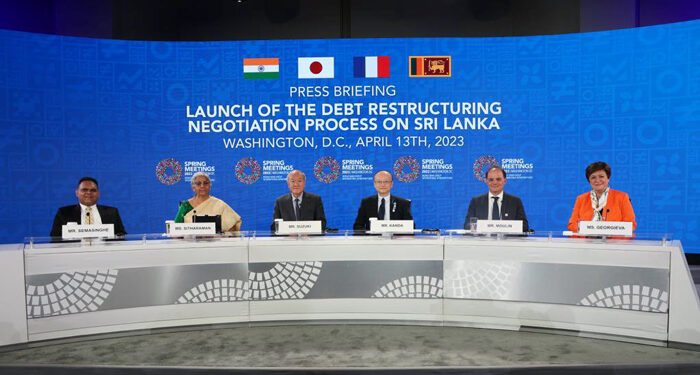NE BUSINESS BUREAU
WASHINGTON, APR 14
India Japan and France have announced a common platform for talks among creditors to address the debt restructuring programme of Sri Lanka which is grappling with its worst economic crisis.
Union Finance Minister Smt. @nsitharaman participated in a High-level event on Sri Lankan debt issues on sidelines of IMF-WB #AnnualMeetings2023, in Washington, today. FM Smt. @nsitharaman expressed India’s support to Sri Lanka for #EconomicRecovery & #debt sustainability. (1/3) pic.twitter.com/gYwJUZpH6V
— Ministry of Finance (@FinMinIndia) April 13, 2023
- Finance Minister Sitharaman expresses India’s commitment to supporting Sri Lanka in dealing with its current economic crisis
- Sri Lanka owes USD 7.1 billion to bilateral creditors, with USD 3 billion owed to China, USD 2.4 billion to the Paris Club and USD 1.6 billion to India
The representatives of the three creditor countries, including Finance Minister Nirmala Sitharaman, held a press briefing on the margins of the annual spring meetings of the World Bank and the International Monetary Fund (IMF) in Washington on Thursday.
“The purpose of the event was to demonstrate the multilateral cooperation regarding the debt restructuring process among the creditors, together with Sri Lanka, said an official statement.
Finance Minister Sitharaman expressed India’s commitment to supporting Sri Lanka in dealing with its current economic crisis.
She emphasised that collaboration among creditors was important to ensure transparency and equality in the debt restructuring discussions.
Sri Lankan President Ranil Wickremesinghe joined the conference virtually.
Japanese Finance Minister Shunichi Suzuki described the launch of the common platform as a historical development.
To be able to launch this negotiation process gathering, such a broad-based group of creditors, is a historical outcome,” he told reporters at the news conference.
“This committee is open to all creditors,” he added, voicing hope that China, Sri Lanka’s biggest creditor, will join the initiative launched by Japan, this year’s G7 chair.
French Director General of the Treasury Emmanuel Moulin also joined Sitharaman and Suzuki at the press conference.
Joining the launch of the debt restructuring negotiation process virtually, President Wickremesinghe said Sri Lanka remains committed to continuing to engage with all creditor nations and other stakeholders in a transparent manner based on the principles of comparable treatment.
Wickremesinghe said he would present in Parliament the agreement with the IMF for the USD 2.9 billion bailout, gain approval and bring in legislation to ensure its implementation, his office said.
Wickremesinghe’s office said India’s Finance Minister Sitharaman had called for close coordination among creditors which was critical to restoring Sri Lanka’s debt sustainability.
She stressed India’s commitment to facilitating an early debt restructuring process, it said.
Sri Lanka secured a USD 2.9 billion programme from the International Monetary Fund (IMF) last month to tackle its huge debt burden.
The Washington-based global lender had made Sri Lanka’s debt restructuring a prerequisite for granting the USD 2.9 billion bailout.
The IMF’s Executive Board approved a 48-month extended arrangement under its Extended Fund Facility (EFF) with an amount of SDR 2.286 billion to Sri Lanka following financing assurances from the creditors.
Sri Lanka, which drew its first tranche of the USD 3 billion bailout programme, has already met an installment to pay back an Indian line of credit which the island nation obtained early last year just before announcing the debt default.
The IMF bailout, the 17th in Sri Lanka’s history, was approved following prolonged discussions over Colombo’s unsustainable debt.
Sri Lanka owes USD 7.1 billion to bilateral creditors, with USD 3 billion owed to China, USD 2.4 billion to the Paris Club and USD 1.6 billion to India, according to official data from its government.
The island nation was hit by an unprecedented financial crisis in 2022, the worst since its independence from Britain in 1948, due to a severe paucity of foreign exchange reserves, sparking a major political and humanitarian crisis in the island nation.












